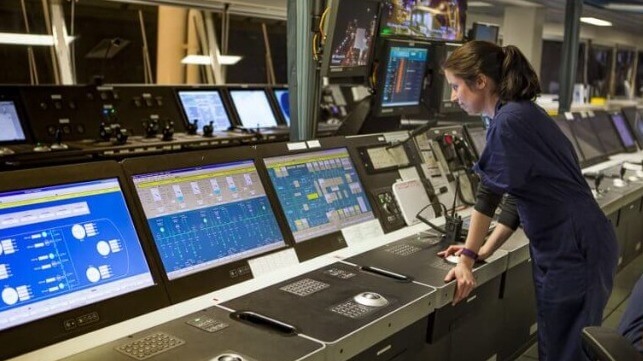National Maritime Day: Why are We Still Asking if Women Belong at Sea?

Over the last year much has been written about female mariners and our role in the maritime industry; unfortunately, the tone and tenor of the coverage might unintentionally dampen the remarkable progress women are making in breaking into this male-dominated realm.
I am a proud merchant mariner and a graduate of the U.S. Merchant Marine Academy. Since 2008, my career has spanned both the maritime and offshore industries, having navigated ships throughout the world, including Antarctica. I love my career, which has afforded me opportunities to cross oceans, visit distant lands and contribute to an industry that moves 90 percent of the world’s goods.
There are exciting career opportunities on the water, especially since the maritime sector is aggressively harnessing new technology, autonomous ships, battery-powered vessels and leading on green fuels.
Women mariners are relatively few, but we are a hardy group and growing by the day, making up 12 percent of U.S. credentialed mariners. Worldwide there’s been a 46 percent uptick in the last seven years, bringing the total number of female seafarers to about 24,000 globally.
This increase is attributable to many factors. Social media has been a huge recruiting tool, but companies are also realizing they can’t box out half the population and expect to attract enough qualified mariners.
Change is difficult for any industry and mine is no different. It’s no secret that sexual harassment and assault (SASH) exists across all workplaces, including out at sea; however, a big part of the solution is to hire more female mariners. We have learned that if only one woman is working aboard a ship, she is significantly more likely to experience forms of SASH.
I know this all too well, from my own career and listening to women in the maritime community. I founded an organization in 2017 called Women Offshore, and I’ve heard firsthand accounts of unacceptable, sometimes illegal, behavior that still occurs offshore.
You may wonder, given this, why would women want to work on a ship? It’s a fair question, leading some to conclude that we don’t belong there. However, SASH knows no gender; such misconduct will occur with or without women aboard. Furthermore, when a workplace issue persists, be it SASH or injuries, it is not enough to just remove the victims; the root cause must be identified to prevent it from recurring. Simply put, preventing women from pursuing careers on the water and achieving new milestones is not a viable solution.
Accountability and prevention are keys to eradicating SASH, and I believe my industry is receptive to change. The Safer Seas Act was introduced in the House in February and subsequently rolled into the Coast Guard Authorization Act (H.R. 6865, Title VI), which passed the House in March with bipartisan support. If enacted, it will accelerate and cement industry-wide improvements. It will make convicted sex offenders ineligible to obtain U.S. merchant marine credentials, penalize companies and bystanders for not reporting crimes of sexual violence, and require a number of additional steps to protect victims and prevent sexual violence aboard ships.
As I write this, I’m ecstatic to be 28 weeks pregnant, and looking forward both to taking paid maternity leave and returning to my vessel as a new mother. I’ll continue to make waves for my daughter, who I hope will follow in my footsteps. After all, she already has several months of offshore experience, and I expect even more doors will be open for women when she emerges into the industry.
On National Maritime Day 2045, I can envision my 23-year-old daughter working in an industry that takes a hard line against sexual violence, holds perpetrators accountable, celebrates bystander intervention and, most importantly, supports victims, regardless of gender.
In this future, maritime companies will have normalized the female presence on board, especially in leadership positions. Women will routinely achieve the high ranks of captain or chief engineer and be celebrated for their accomplishments, not their gender.

that matters most
Get the latest maritime news delivered to your inbox daily.
Today as we celebrate this National Maritime Day, I challenge industry leaders to soundly repudiate hide-bound mindsets that marginalize female mariners, assertively recruit and support women and implement changes that will foster inclusive and safe workplaces for all mariners.
When not working offshore, Ally Cedeno resides in Houston, TX where the advocacy group she founded, Women Offshore, is headquartered.
The opinions expressed herein are the author's and not necessarily those of The Maritime Executive.
